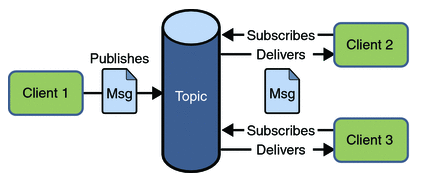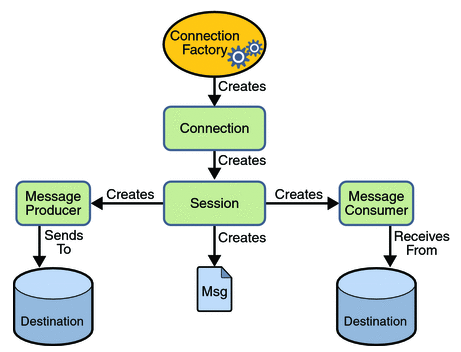J2EE - JMS
Pre - Message Queue
什么是消息队列
消息队列(Message Queue)是一种进程间通信或同一进程的不同线程间的通信方式。
实现
消息队列常常保存在链表结构中,拥有权限的进程可以向消息队列中写入或读取消息。
特点
- 主要特点是异步处理
- 主要目的是减少请求响应时间和解耦
- 主要的使用场景就是将比较耗时而且不需要即时(同步)返回结果的操作作为消息放入消息队列
Pre - Usage
使用场景1:用户注册
- 校验用户名等信息,如果没问题会在数据库中添加一个用户记录(同步)
- 如果是用邮箱注册会给你发送一封注册成功的邮件,手机注册则会发送一条短信(异步)
- 分析用户的个人信息,以便将来向他推荐一些志同道合的人,或向那些人推荐他(异步)
- 发送给用户一个包含操作指南的系统通知(异步)
使用场景2:秒杀活动
比如服务器一秒能处理100个订单,但秒杀活动1秒进来1000个订单,持续10秒,在后端能力无法增加的情况下, 可以用消息队列将总共10000个请求压在队列里,后台consumer按原有能力处理,100秒后处理完所有请求(而不是直接宕机丢失订单数据)。
(再次强调,主要就是将可分割的流程/操作解耦,使其可以异步处理。)
Intro - JMS
JMS (Java Message Service) is an API that provides the facility to create, send and read messages from one application to another.
解读:JMS和JDBC一样,都是一套标准,具体的实现还是要看各大厂商。比如常见的实现有以下这些:
- Spring JMS
- Apache ActiveMQ
- RabbitMQ
JMS - Messaging Domains
1.Point-to-Point (PTP) Messaging Domain
In PTP model, one message is delivered to one receiver only. Here, Queue is used as a message oriented middleware (MOM).

2.Publisher/Subscriber (Pub/Sub) Messaging Domain
In Pub/Sub model, one message is delivered to all the subscribers. It is like broadcasting. Here, Topic is used as a message oriented middleware that is responsible to hold and deliver messages.

JMS - Programming Model

Note: The destination can be either Queue or Topic.
JMS - General Implementation Steps
- register elements: ConnectionFactory, destination(Queue or Topic)
- register Connection and Session
- start the connection
- create MessageProducer and send message
- create MessageConsumer and receive message
JMS - Receiving Model
消费者有两种接受消息的模式:
- Synchronous
consumer.receive()/consumer.receive(int timeout)- 消费者会一直等待直到消息到达或超时
- Asynchronous
- using
MessageListener- 消费者注册一个监听器,当接到消息时进行callback操作
- using
In Practice - ActiveMQ
Elements
- producer: create producer and send message
- synch-consumer1: create synch-consumer1 and receive message
- asynch-consumer2: create asynch-consumer2 and receive message
- application context: manage connection and session
- main(): start the app
App:主程序
public class App {
public static void main(String[] args) throws Exception {
AppContext appContext = new AppContext();
appContext.startSession();
new Thread(new Producer(appContext)).start();
new Thread(new Consumer(appContext)).start();
Thread.sleep(2000);
new Thread(new Producer(appContext)).start();
new Thread(new Consumer2(appContext)).start();
Thread.sleep(2000);
appContext.endConnection();
}
}
AppContext:用来初始化及保存连接对象
import org.apache.activemq.ActiveMQConnection;
import org.apache.activemq.ActiveMQConnectionFactory;
import javax.jms.Connection;
import javax.jms.Destination;
import javax.jms.Session;
public class AppContext {
private static final String USERNAME = ActiveMQConnection.DEFAULT_USER;
private static final String PASSWORD = ActiveMQConnection.DEFAULT_PASSWORD;
private static final String BROKEURL = ActiveMQConnection.DEFAULT_BROKER_URL;
private ActiveMQConnectionFactory connectionFactory;
private Connection connection;
private Session session;
private Destination destination;
public void startSession() {
try {
// Create a ConnectionFactory
connectionFactory = new ActiveMQConnectionFactory(this.USERNAME, this.PASSWORD, this.BROKEURL);
// Create a Connection
connection = connectionFactory.createConnection();
// Create a Session
session = connection.createSession(false, Session.AUTO_ACKNOWLEDGE);
// Create the destination (Topic or Queue)
destination = session.createQueue("TEST.FOO");
// start the connection
connection.start();
} catch(Exception e) {
e.printStackTrace();
}
}
public void endConnection() {
try {
session.close();
connection.close();
} catch(Exception e) {
e.printStackTrace();
}
}
public ActiveMQConnectionFactory getConnectionFactory() {
return connectionFactory;
}
public void setConnectionFactory(ActiveMQConnectionFactory connectionFactory) {
this.connectionFactory = connectionFactory;
}
public Connection getConnection() {
return connection;
}
public void setConnection(Connection connection) {
this.connection = connection;
}
public Session getSession() {
return session;
}
public void setSession(Session session) {
this.session = session;
}
public Destination getDestination() {
return destination;
}
public void setDestination(Destination destination) {
this.destination = destination;
}
}
Producer
import javax.jms.*;
public class Producer implements Runnable {
private Session session;
private Destination destination;
public Producer(AppContext appContext) {
this.session = appContext.getSession();
this.destination = appContext.getDestination();
}
public void run() {
try {
// Create a MessageProducer from the Session to the Topic or Queue
MessageProducer producer = session.createProducer(destination);
producer.setDeliveryMode(DeliveryMode.NON_PERSISTENT);
// Create a messages
String text = "Hello world! From: " + Thread.currentThread().getName() + " : " + this.hashCode();
TextMessage message = session.createTextMessage(text);
// Tell the producer to send the message
System.out.println("Sent message: "+ message.hashCode() + " : " + Thread.currentThread().getName());
producer.send(message);
}
catch (Exception e) {
System.out.println("Caught: " + e);
e.printStackTrace();
}
}
}
Consumer1: using Synchronous Receive
import javax.jms.*;
public class Consumer implements Runnable {
private Session session;
private Destination destination;
public Consumer(AppContext appContext) {
this.session = appContext.getSession();
this.destination = appContext.getDestination();
}
public void run() {
try {
// Create a MessageConsumer from the Session to the Topic or Queue
MessageConsumer consumer = session.createConsumer(destination);
// Wait for a message
Message message = consumer.receive(1000);
// Deal with message
if (message instanceof TextMessage) {
TextMessage textMessage = (TextMessage) message;
String text = textMessage.getText();
System.out.println("C1, received: " + text);
} else {
System.out.println("C1, received: " + message);
}
consumer.close();
} catch (Exception e) {
e.printStackTrace();
}
}
}
Consumer2: using Asynchronous Receive
import javax.jms.*;
public class Consumer2 implements Runnable {
private Session session;
private Destination destination;
public Consumer2(AppContext appContext) {
this.session = appContext.getSession();
this.destination = appContext.getDestination();
}
public void run() {
try {
// Create a MessageConsumer from the Session to the Topic or Queue
MessageConsumer consumer2 = session.createConsumer(destination);
consumer2.setMessageListener(new MessageListener() {
public void onMessage(Message msg) {
TextMessage textMsg = (TextMessage) msg;
try {
System.out.println("C2, received: " + textMsg.getText());
} catch (JMSException e) {
e.printStackTrace();
}
}
});
Thread.sleep(1000);
consumer2.close();
} catch (Exception e) {
e.printStackTrace();
}
}
}
Note: the example uses ActiveMQ, you need to start it first.
cd [activemq_install_dir]
bin\activemq start
check the result in web console: http://127.0.0.1:8161/admin/
